If you’d rather not leave a comment or just don’t have the time please click the like button at the bottom of the page.
Segments of this Blog are taken wholly or in part from Wikipedia; a valuable and free source of information.
African American Freedom Day
September 7th, 2016
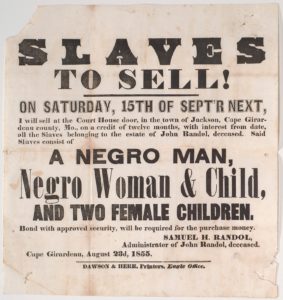 I love the 4th of July, Who doesn’t? It’s a day off of work, time for a beer drinking barbeque and a time to reflect on why we get to do those things. But of course the July 4th, 1776 wasn’t independence day for all Americans. Independence day for Africans in America in the South is December 6th, 1865. Slavery in the North American colonies started 397 years ago in Jamestown Virginia. They were only held as slaves for 7 years but it would lead to 246 years of oppression and cruelty. Some say it started earlier in January 1526 when the Spaniards tried to colonize South Carolina. The slaves revolted, won their freedom, and joined a nearby tribe of Native Americans. The Spanish then abandoned the colony altogether.
I love the 4th of July, Who doesn’t? It’s a day off of work, time for a beer drinking barbeque and a time to reflect on why we get to do those things. But of course the July 4th, 1776 wasn’t independence day for all Americans. Independence day for Africans in America in the South is December 6th, 1865. Slavery in the North American colonies started 397 years ago in Jamestown Virginia. They were only held as slaves for 7 years but it would lead to 246 years of oppression and cruelty. Some say it started earlier in January 1526 when the Spaniards tried to colonize South Carolina. The slaves revolted, won their freedom, and joined a nearby tribe of Native Americans. The Spanish then abandoned the colony altogether. 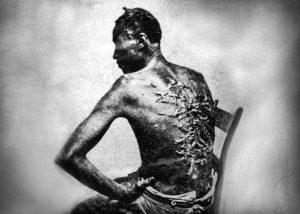 There are those who feel that slavery was righteous and that we should live that way today. There are far more of us that understand how wrong it is to enslave another people. We’ve come so far in just a short period of time. Two or three generations; 151 years ago the Thirteenth Amendment was ratified and Africans in America became African Americans; full citizens. Today we have a Mulatto President. Whether you love him or hate him it’s still a great American accomplishment to think that his grandfather could have been a slave. Now Caucasians and African Americans of every variety are shoulder to shoulder, eye to eye, and brother and sister.
There are those who feel that slavery was righteous and that we should live that way today. There are far more of us that understand how wrong it is to enslave another people. We’ve come so far in just a short period of time. Two or three generations; 151 years ago the Thirteenth Amendment was ratified and Africans in America became African Americans; full citizens. Today we have a Mulatto President. Whether you love him or hate him it’s still a great American accomplishment to think that his grandfather could have been a slave. Now Caucasians and African Americans of every variety are shoulder to shoulder, eye to eye, and brother and sister. 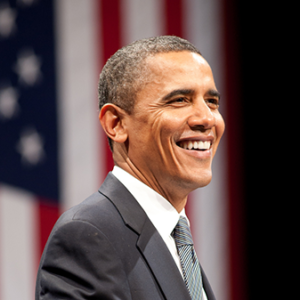 Certainly celebration is in order. Employers don’t want to give another paid holiday I’m sure, but this is worth it. If your African American how can you really call the 4th of July independence day unless you know your family was free in the North. Sure we can honor the independence of America but not personal freedom. I don’t want a celebration for just African Americans but for all those who joined the fight to see that Africans in America would gain their independence and become citizens. A day that upholds unity and brotherhood; sisterhood as well.
Certainly celebration is in order. Employers don’t want to give another paid holiday I’m sure, but this is worth it. If your African American how can you really call the 4th of July independence day unless you know your family was free in the North. Sure we can honor the independence of America but not personal freedom. I don’t want a celebration for just African Americans but for all those who joined the fight to see that Africans in America would gain their independence and become citizens. A day that upholds unity and brotherhood; sisterhood as well.
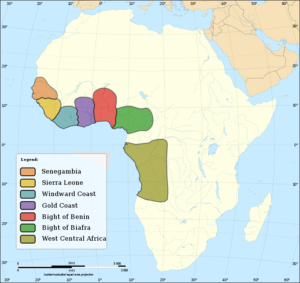 The Portuguese, British, French, Spanish, and Dutch Empire were the major Atlantic slave trading nations. Several of them had established outpost on the West African Coast where they would purchase slaves from local leaders. Europeans seldom entered the interior of Africa for fear of disease and fierce resistance. The Muslim slave trade was huge but in Southeast Africa, North Africa, and West Asia. I had heard that Africans sold other Africans into slavery but was astonished to find out how big a part of the African economy it was. Africans selling Africans sounds pretty bad but there was no solidarity just because of skin color. These were separate and warring lands. I mean if you had a chance to sell isis and never hear from them again wouldn’t you be temped to do that. African Kings and merchants took part in the African slave trade from 1440-1833. The majority of slaves were prisoners of war. There were also those who were criminals and those who just got abducted. King Jaja of Opobo was a former slave and refused to do business with slavers.
The Portuguese, British, French, Spanish, and Dutch Empire were the major Atlantic slave trading nations. Several of them had established outpost on the West African Coast where they would purchase slaves from local leaders. Europeans seldom entered the interior of Africa for fear of disease and fierce resistance. The Muslim slave trade was huge but in Southeast Africa, North Africa, and West Asia. I had heard that Africans sold other Africans into slavery but was astonished to find out how big a part of the African economy it was. Africans selling Africans sounds pretty bad but there was no solidarity just because of skin color. These were separate and warring lands. I mean if you had a chance to sell isis and never hear from them again wouldn’t you be temped to do that. African Kings and merchants took part in the African slave trade from 1440-1833. The majority of slaves were prisoners of war. There were also those who were criminals and those who just got abducted. King Jaja of Opobo was a former slave and refused to do business with slavers. 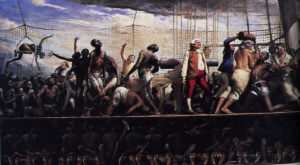 Some African groups proved particularly adept and brutal at the practice of enslaving, such as Oyo, Benin, Igala, Kaabu, Asanteman, Dahomey, the Aro Confederacy and the Imbangala war bands. Three of the biggest culprits were the expanding lands of the kingdom of Dahomey, the Oyo Empire, and the Asante Empire.
Some African groups proved particularly adept and brutal at the practice of enslaving, such as Oyo, Benin, Igala, Kaabu, Asanteman, Dahomey, the Aro Confederacy and the Imbangala war bands. Three of the biggest culprits were the expanding lands of the kingdom of Dahomey, the Oyo Empire, and the Asante Empire.
The different ethnic groups brought to the Americas closely corresponds to the regions of heaviest activity in the slave trade. Over 45 distinct ethnic groups were taken to the Americas during the trade. Of the 45, the ten most prominent, according to slave documentation of the era are listed below. If you’re African American there’s a good chance that your blood line runs to one of the people and places listed.
- The BaKongo of the Democratic Republic of Congo and Angola
- The Mandé of Upper Guinea
- The Gbe speakers of Togo, Ghana and Benin (Adja, Mina, Ewe, Fon)
- The Akan of Ghana and Ivory Coast
- The Wolof of Senegal and the Gambia
- The Igbo of southeastern Nigeria
- The Mbundu of Angola (includes both Ambundu and Ovimbundu)
- The Yoruba of southwestern Nigeria
- The Chamba of Cameroon
- The Makua of Mozambique
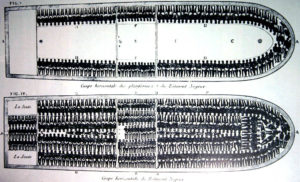 Native born people to European colonies kept dying of old world diseases. The Tupi from Brazil is an example of how disease almost wiped out an entire people. The voyage across the Atlantic killed many Africans. Slave traders would try to fit between 350 to 600 slaves on a ship. About 1.5 million died in transport. Cultures, families and ways of life were destroyed, obliterated. About 10.5 million Africans arrived in the Americas to begin a life of servitude. As well as the previous estimates Patrick Manning also estimates that 4 million Africans died in Africa after capture.
Native born people to European colonies kept dying of old world diseases. The Tupi from Brazil is an example of how disease almost wiped out an entire people. The voyage across the Atlantic killed many Africans. Slave traders would try to fit between 350 to 600 slaves on a ship. About 1.5 million died in transport. Cultures, families and ways of life were destroyed, obliterated. About 10.5 million Africans arrived in the Americas to begin a life of servitude. As well as the previous estimates Patrick Manning also estimates that 4 million Africans died in Africa after capture.
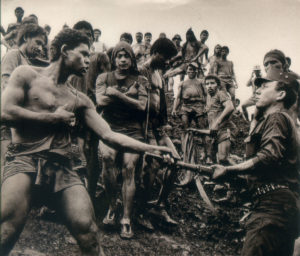 Sometimes to get others to join your fight for freedom you have to be willing to kill and die yourself. (excerpt) “it was not long before African naval forces were alerted to the new dangers, and the Portuguese [raiding] ships began to meet strong and effective resistance”, with the crews of several of them being killed by African sailors, whose boats were better equipped at traversing the west African coasts and river systems. (end excerpt) The Haitian Revolution (French: Révolution haïtienne [ʁevɔlysjɔ̃ ajisjɛ̃n]), was a successful anti-slavery and anti-colonial insurrection that took place in the former French colony of Saint Domingue that lasted from 1791 until 1804. It impacted the institution of slavery throughout the Americas. Self-liberated slaves destroyed slavery at home, fought to preserve their freedom, and with the collaboration of mulattoes, founded the sovereign state of Haiti. It led to the greatest slave uprising since Spartacus, who led an unsuccessful revolt against the Roman Republic nearly 1,900 years prior.
Sometimes to get others to join your fight for freedom you have to be willing to kill and die yourself. (excerpt) “it was not long before African naval forces were alerted to the new dangers, and the Portuguese [raiding] ships began to meet strong and effective resistance”, with the crews of several of them being killed by African sailors, whose boats were better equipped at traversing the west African coasts and river systems. (end excerpt) The Haitian Revolution (French: Révolution haïtienne [ʁevɔlysjɔ̃ ajisjɛ̃n]), was a successful anti-slavery and anti-colonial insurrection that took place in the former French colony of Saint Domingue that lasted from 1791 until 1804. It impacted the institution of slavery throughout the Americas. Self-liberated slaves destroyed slavery at home, fought to preserve their freedom, and with the collaboration of mulattoes, founded the sovereign state of Haiti. It led to the greatest slave uprising since Spartacus, who led an unsuccessful revolt against the Roman Republic nearly 1,900 years prior.
There came to be a United States and British ban on slave trading in 1808. Some argue the decisions were financially based and others that they were based on morality. Chances are that it was both.
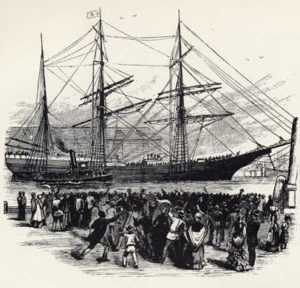 In 1816, a group of wealthy European-Americans, some of whom were abolitionists and others who were racial segregationists, founded the American Colonization Society with the express desire of returning Africans who were in the United States to West Africa. In 1820, they sent their first ship to Liberia, and within a decade around two thousand Africans had been settled in the west African country. Such re-settlement continued throughout the 19th century, increasing following the deterioration of race relations in the southern states of the US following Reconstruction in 1877.
In 1816, a group of wealthy European-Americans, some of whom were abolitionists and others who were racial segregationists, founded the American Colonization Society with the express desire of returning Africans who were in the United States to West Africa. In 1820, they sent their first ship to Liberia, and within a decade around two thousand Africans had been settled in the west African country. Such re-settlement continued throughout the 19th century, increasing following the deterioration of race relations in the southern states of the US following Reconstruction in 1877.
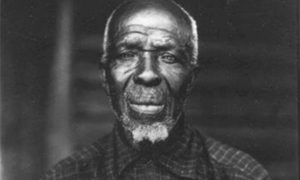 Finally the last recorded slave ship to touch American soil was the Clotilde. Slaves were smuggled from it illegally into Mobile Alabama. The last survivor of the voyage was Cudjoe Lewis, who died in 1935.
Finally the last recorded slave ship to touch American soil was the Clotilde. Slaves were smuggled from it illegally into Mobile Alabama. The last survivor of the voyage was Cudjoe Lewis, who died in 1935.
The United Nations Educational, Scientific, and Cultural Organization (UNESCO) designated August 23rd as International Day for the Remembrance of the Slave Trade and its Abolition.
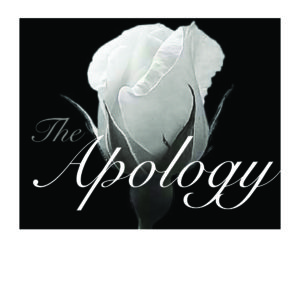 At the 2001 World Conference Against Racism in Durban South Africa, African nations demanded a clear apology from former slave trading countries. Some nations were ready and willing to comply but the initiative was blocked by opposition that the United States was a part of until 2009. The other countries opposed to the apology were the United Kingdom, Portugal, Spain, and the Netherlands. Here are the apologies that were received.
At the 2001 World Conference Against Racism in Durban South Africa, African nations demanded a clear apology from former slave trading countries. Some nations were ready and willing to comply but the initiative was blocked by opposition that the United States was a part of until 2009. The other countries opposed to the apology were the United Kingdom, Portugal, Spain, and the Netherlands. Here are the apologies that were received.
Benin
In 1999, President Mathieu Kerekou of Benin (formerly the Kingdom of Dahomey) issued a national apology for the role Africans played in the Atlantic slave trade. Luc Gnacadja, minister of environment and housing for Benin, later said: “The slave trade is a shame, and we do repent for it.” Researchers estimate that 3 million slaves were exported out of the Slave Coast bordering the Bight of Benin.
France
On 30 January 2006, Jacques Chirac (the then French President) said that 10 May would henceforth be a national day of remembrance for the victims of slavery in France, marking the day in 2001 when France passed a law recognizing slavery as a crime against humanity.
Ghana
President Jerry Rawlings of Ghana also apologized for his country’s involvement in the slave trade.
Nigeria
In 2009, the Civil Rights Congress of Nigeria has written an open letter to all African chieftains who participated in trade calling for an apology for their role in the Atlantic slave trade: “We cannot continue to blame the white men, as Africans, particularly the traditional rulers, are not blameless. In view of the fact that the Americans and Europe have accepted the cruelty of their roles and have forcefully apologized, it would be logical, reasonable and humbling if African traditional rulers … [can] accept blame and formally apologize to the descendants of the victims of their collaborative and exploitative slave trade.”
Uganda
In 1998, President Yoweri Museveni of Uganda, called tribal chieftains to apologize for their involvement in the slave trade: “African chiefs were the ones waging war on each other and capturing their own people and selling them. If anyone should apologise it should be the African chiefs. We still have those traitors here even today.”
United Kingdom
On 9 December 1999, Liverpool City Council passed a formal motion apologizing for the City’s part in the slave trade. It was unanimously agreed that Liverpool acknowledges its responsibility for its involvement in three centuries of the slave trade. The City Council has made an unreserved apology for Liverpool’s involvement and the continual effect of slavery on Liverpool’s Black communities.
On 27 November 2006, British Prime Minister Tony Blair made a partial apology for Britain’s role in the African slavery trade. However African rights activists denounced it as “empty rhetoric” that failed to address the issue properly. They feel his apology stopped shy to prevent any legal retort. Blair again apologized on March 14, 2007.
On 24 August 2007, Ken Livingstone (Mayor of London) apologized publicly for London’s role in the slave trade. “You can look across there to see the institutions that still have the benefit of the wealth they created from slavery”, he said pointing towards the financial district, before breaking down in tears. He claimed that London was still tainted by the horrors of slavery. Jesse Jackson praised Mayor Livingstone, and added that reparations should be made.
United States
On 24 February 2007 the Virginia General Assembly passed House Joint Resolution Number 728 acknowledging “with profound regret the involuntary servitude of Africans and the exploitation of Native Americans, and call for reconciliation among all Virginians.” With the passing of that resolution, Virginia became the first of the 50 United States to acknowledge through the state’s governing body their state’s involvement in slavery. The passing of this resolution came on the heels of the 400th anniversary celebration of the city of Jamestown, Virginia, which was the first permanent English colony to survive in what would become the United States. Jamestown is also recognized as one of the first slave ports of the American colonies. On 31 May 2007, the Governor of Alabama, Bob Riley, signed a resolution expressing “profound regret” for Alabama’s role in slavery and apologizing for slavery’s wrongs and lingering effects. Alabama is the fourth state to pass a slavery apology, following votes by the legislatures in Maryland, Virginia, and North Carolina.
On 30 July 2008, the United States House of Representatives passed a resolution apologizing for American slavery and subsequent discriminatory laws. The language included a reference to the “fundamental injustice, cruelty, brutality and inhumanity of slavery and Jim Crow” segregation. On 18 June 2009, the United States Senate issued an apologetic statement decrying the “fundamental injustice, cruelty, brutality, and inhumanity of slavery”. The news was welcomed by President Barack Obama.
 It would be nice if my grandchildren were born into Occupational Parenting and a world that has fully apologized for slavery. Until then let’s commemorate the independence of our Country and freedom of our people. December 6th should be African American Freedom Day for all Americans to celebrate. Until next time, keep your homes well.
It would be nice if my grandchildren were born into Occupational Parenting and a world that has fully apologized for slavery. Until then let’s commemorate the independence of our Country and freedom of our people. December 6th should be African American Freedom Day for all Americans to celebrate. Until next time, keep your homes well.
Welcome Occupational Parenting Health and Happiness The Human Element The Perceivable Universe The Environment Word Play Conclusion Glossary In The Kitchen Pets Tips Cleaning Tips Parenting Tips Blog
Thank you so much for that information. I’d never heard of Juneteenth before. I still like December 6th better due to when the deed was done but as long as someone has the ball rolling, it’s good. Hopefully the celebration will gain popularity and become Federally recognized. It’s been long coming. Thank you so much for reading Tashee and thanx a bunch for the knowledge.